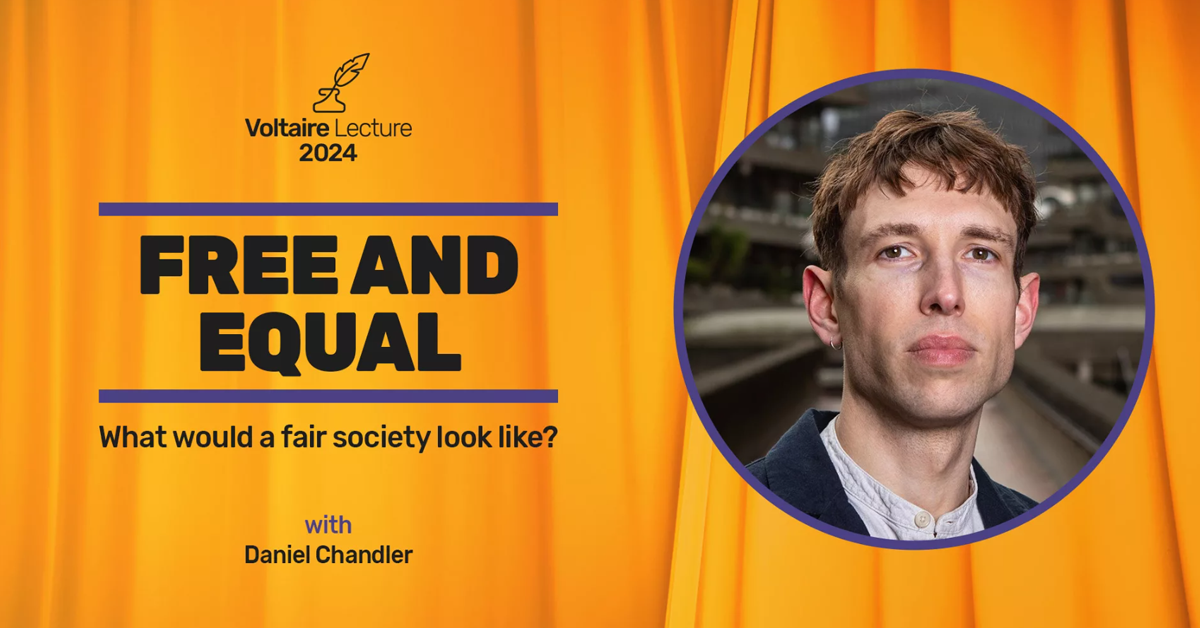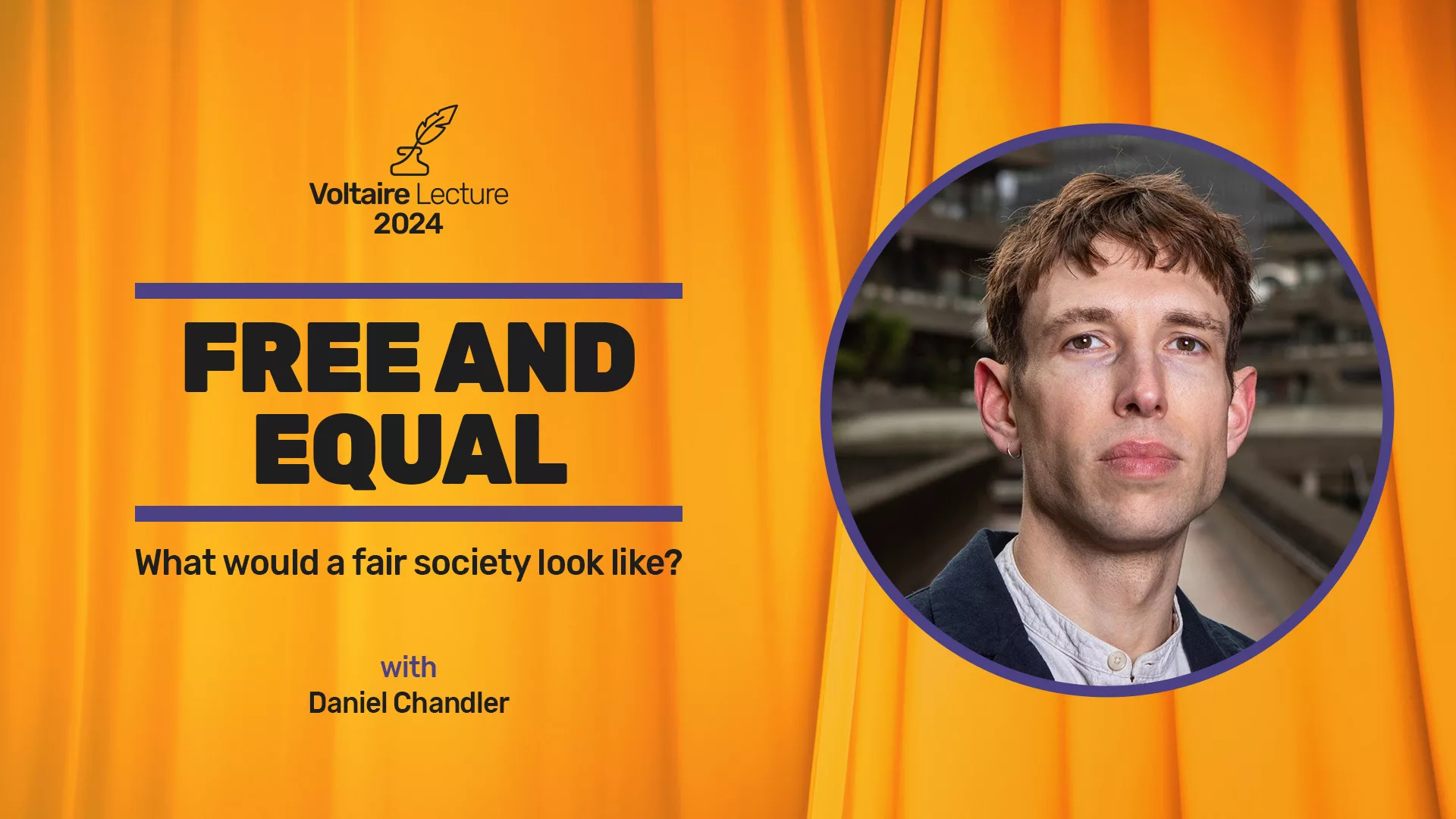
In anticipation of the Voltaire Lecture on 10 September, we are delighted to present this exclusive interview with the distinguished recipient of the 2024 Voltaire Lecture Medal, the economist and philosopher Daniel Chandler.
Daniel Chandler will present the Voltaire Lecture 2024: ‘Free and Equal – What would a fair society look like?’ Tickets are available to watch the lecture in-person in central London, or via livestream.
In your Voltaire Lecture, you’ll be exploring some of the ideas of the humanist philosopher John Rawls. Could you share why you believe his ideas are particularly relevant today?
Rawls is the towering figure of twentieth century political philosophy – he’s frequently compared to the likes of John Stuart Mill, Hobbes, even Plato. What I love about his ideas, and why I think we need them right now, is that they are fundamentally hopeful and constructive. In contrast to our current political debate, which is often narrow and technocratic, Rawls set out a vision of the best that a democratic society can be – what he called a ‘realistic utopia’. It’s a vision of society grounded not in self-interest and competition but in reciprocity and cooperation, and I think it represents an unparalleled resource for developing the kind of big picture vision that has been missing from progressive politics in recent decades, and which we urgently need if we are to overcome the threat of authoritarian populism.
What is the veil of ignorance and why is it important?
One of Rawls’s most famous ideas is that if we want to know what a fair society would look like, we should imagine how we would choose to organise it if we didn’t know what our position within that society would be – whether we could be rich or poor, black or white, Christian or Muslim and so on – as if behind what he called a ‘veil of ignorance’. It’s a very intuitive way to think about fairness, similar to the idea that someone might cut a cake more fairly if they didn’t know which piece they would end up getting. And while it can sound a bit abstract and unfamiliar, especially when presented in the jargon of academic philosophy, it clearly echoes the ‘golden rule’ – ‘Do unto others as you would have them do unto you’ – some version of which is found in many, if not most, major religious and cultural traditions.
Rawls uses this thought experiment to justify two fundamental principles of justice, principles, to do with freedom and equality respectively – hence the title of my recent book, Free and Equal. First, he argues that we would want to guarantee a set of truly fundamental freedoms, including personal freedoms like freedom of speech, religion, sexuality and so on, and political freedoms, like the right to vote and freedom of assembly. The idea here is that if we didn’t know our race, gender, religion, sexual orientation, and so on, we would want to make sure that we could live freely according to our own beliefs, and participate in politics as equals.
That’s the essence of Rawls’s first ‘basic liberties’ principle, which supports a widely shared ideal of liberal democracy, albeit one that needs defending today. Rawls’s second ‘equality’ principle actually has two parts, combining ‘fair equality of opportunity’ – everyone should have an equal chance to develop their talents and abilities; with the ‘difference principle’ – the idea that inequalities are only justified if they ultimately benefit everyone, and especially the least well off. In fact, Rawls argues that we should try to organise our economy so that the least well off are better off than they would be under any alternative system. While equality of opportunity is a familiar idea, the difference principle is a strikingly original and strongly egalitarian way of thinking about social justice. It recognises the role of incentives in creating a dynamic market economy, but calls on us to make sure that everyone shares in the benefits, right down to the least well off.
Is the veil of ignorance more than just a thought experiment? Can it be a call to action?
Absolutely! It is hard to imagine anyone taking Rawls’s thought experiment seriously and concluding that we should be satisfied with the status quo. Rawls’s two principles give us both an inspiring vision of what a truly just society would look like, and a benchmark for seeing where our existing institutions fall short. Unfortunately Rawls didn’t say very much about how we could put his principles into practice, and as both an economist as well as a philosopher, I’ve tried to pick up where he left off and spell out a bold but achievable practical agenda to transcend the culture wars, reinvigorate democracy and transform capitalism as we know it.
Your book Free and Equal touches upon the concept of a universal basic income. Tell us more!
Making sure that every citizen has food to eat, clothes to wear, a place to live – in other words, that they can meet their ‘basic needs’ – is perhaps the most fundamental requirement of a just society. We can do that through targeted, means-tested benefits, and that is probably the cheapest approach. But money isn’t the only thing that matters. Our current system generates stigma, and rests on intrusive and humiliating eligibility assessments, often causing serious harm to people’s mental health. A basic income would eliminate this stigma, because it would be received by everyone; it would make sure that even the least well off have a sense of agency and independence; and it would make it easier for people on low incomes to enter paid work, with all the benefits that can have for giving people a sense of purpose and individual meaning.
Although a basic income has an important role to play in providing a floor in terms of material resources, I think we need to be moving away from an economic paradigm that relies too heavily on redistribution. Our aim should be to tackle inequality at its source, or what is sometimes called ‘predistribution’, and Rawls was an early advocate for this kind of approach. That means focusing ‘good jobs’ – through minimum wages, stronger unions and investing in education, especially for the more than half of the population who don’t go to university; it means bringing about a more equal distribution of wealth, say via a universal minimum inheritance paid to every citizens at the age of 18; and putting real power in the hands of workers, through something like the German system of co-management, where have a third to a half of the seats on company boards.
You’ve been a vocal advocate for electoral reform in the UK. What are the most pressing issues with the current system, and what changes would you like to see implemented?
The basic problem with our ‘first past the post’ (FPTP) electoral system, is that some votes count more than others. We saw that more clearly than ever in the recent election, where it took an average of 23,500 votes for Labour to win a seat compared to more than 820,000 per Reform MP. Whatever you think of Reform, that’s not a sensible way for a democracy to function. A more proportional system would mean that votes are translated directly into seats, which in turn would encourage a multi-party democracy that is more likely to represent the diversity of views that exist in our society. And in contrast to FPTP where attention is skewed towards voters in marginal constituencies, proportional representation would incentivise politicians to appeal to voters rights across the country.
How do you see the relationship between economic inequality and political power? And what steps can be taken to address this imbalance?
Both economic inequality and imbalances of political power matter in their own right, and in practice they tend to reinforce one another.
The essence of democracy, and a core part of Rawls’s first principle, is a commitment to political equality – not just the formal equality of everyone having the right to vote, but the substantive equality of a political system that gives everyone an equal chance to take part in and influence collective decision making. Sadly, we’re a long way away from that reality. You can see that most clearly in the influence that rich donors have over political parties. We don’t yet have data for the 2024 election, but in 2019 almost half of all donations to political parties came from 104 individual ‘super-donors’, giving an average of nearly half a million pounds each.
The best way to fix this would be to introduce a ‘democracy voucher’ system, similar to that which exists in Seattle for municipal elections, where private donations are capped at a low level, and instead every citizen gets a voucher worth up to $100 that they can give to the candidate of their choice. It’s not a panacea – we also need to make sure that MPs better reflect the life experiences of the whole population, and to tackle the concentration of ownership in the news media – but it would be a good start!
Are you a humanist? If so, what resonated with you about the humanist approach to life?
I have to confess that humanism is a term I have often felt a connection to, without fully understanding what it means! I’ve been learning more in preparation for my lecture, and see more clearly now that I share many humanist ideas and attitudes, including a fundamental commitment to equal human dignity, a scientific outlook grounded in human experience, and a hopeful belief in the possibilities of human cooperation.
Are there any Humanists UK campaigns that are close to your heart?
Humanists UK has so many great campaigns, so it’s hard to choose! I’m gay, so your long record of campaigning for LGBT equality strikes a personal chord. I was very moved to learn that you performed same-sex weddings ceremonies even before the decriminalisation of homosexuality, and I think your work on Relationships and Sex Education today is crucial just for creating a more tolerant and respectful society. I’ve also followed and supported your campaign to get non-religious beliefs represented in broadcast media slots like ‘Thought for the Day’ – it’s about time!

Free and equal: what would a fair society look like? | The Voltaire Lecture 2024, with Daniel Chandler
10 September 2024, 19:30
This event is now closed.
Notes
About Daniel Chandler
Daniel Chandler is an economist and philosopher based at the London School of Economics. He has degrees in economics, philosophy, and history from Cambridge and the LSE, and was awarded a Henry Fellowship at Harvard where he studied under Amartya Sen. He has worked in the UK Government as a policy advisor in the Prime Minister’s Strategy Unit and Deputy Prime Minister’s Office, and as a researcher at think tanks including the Resolution Foundation and Institute for Fiscal Studies.
About the Voltaire Lecture series
The Voltaire Lecture explores ‘any aspect of scientific or philosophical thought or human activity as affected by or with particular reference to humanism’. The Voltaire medallist has made a significant contribution in one of these fields.
The lecture and medal are named for the philosopher Voltaire. The inaugural lecture took place in 1968 and was delivered by Theodore Besterman, biographer of Voltaire, who went on to fund the lecture series in his legacy.
